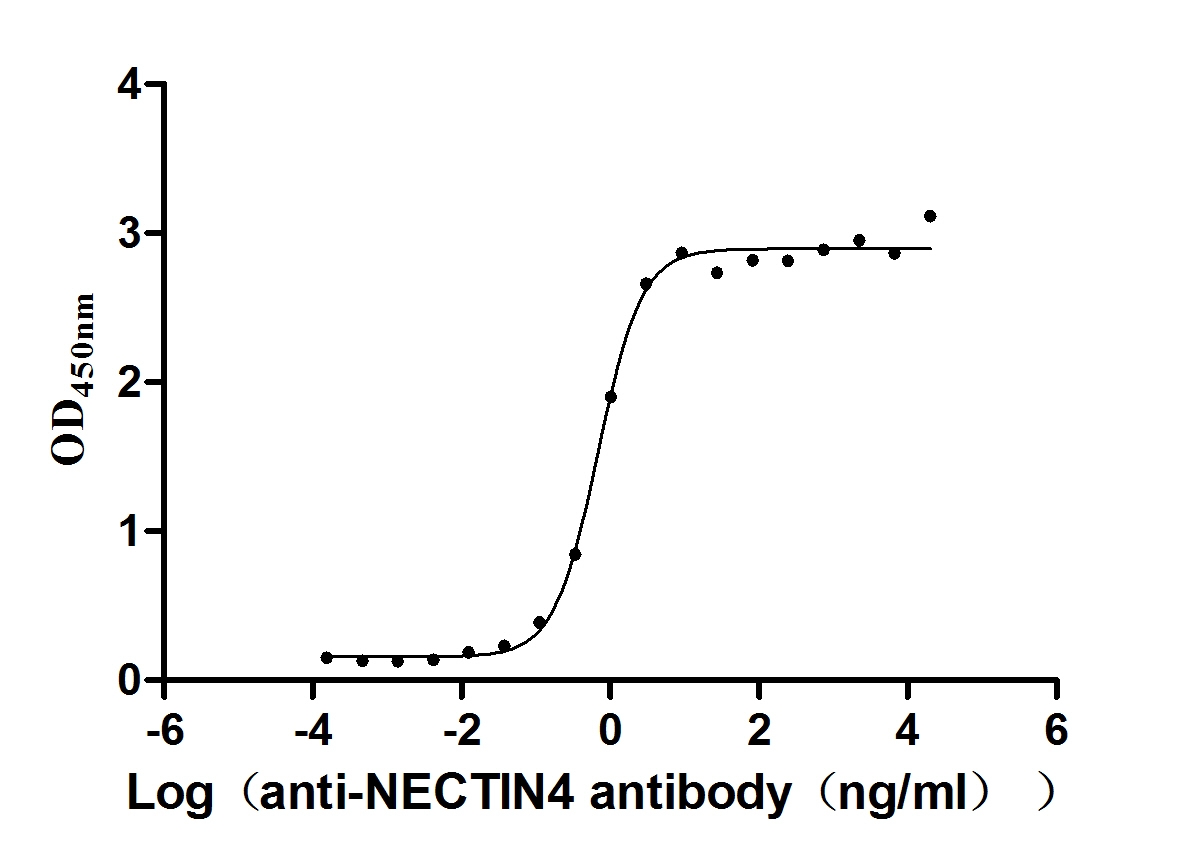Recombinant Cryptosporidium parvum ATPase ASNA1 homolog (cgd7_4070)
-
中文名稱:Recombinant Cryptosporidium parvum ATPase ASNA1 homolog (cgd7_4070),Yeast
-
貨號(hào):CSB-YP386467CXO
-
規(guī)格:
-
來源:Yeast
-
其他:
-
中文名稱:Recombinant Cryptosporidium parvum ATPase ASNA1 homolog (cgd7_4070),Yeast
-
貨號(hào):CSB-EP386467CXO
-
規(guī)格:
-
來源:E.coli
-
其他:
-
中文名稱:Recombinant Cryptosporidium parvum ATPase ASNA1 homolog (cgd7_4070),Yeast
-
貨號(hào):CSB-EP386467CXO-B
-
規(guī)格:
-
來源:E.coli
-
共軛:Avi-tag Biotinylated
E. coli biotin ligase (BirA) is highly specific in covalently attaching biotin to the 15 amino acid AviTag peptide. This recombinant protein was biotinylated in vivo by AviTag-BirA technology, which method is BriA catalyzes amide linkage between the biotin and the specific lysine of the AviTag.
-
其他:
-
中文名稱:Recombinant Cryptosporidium parvum ATPase ASNA1 homolog (cgd7_4070),Yeast
-
貨號(hào):CSB-BP386467CXO
-
規(guī)格:
-
來源:Baculovirus
-
其他:
-
中文名稱:Recombinant Cryptosporidium parvum ATPase ASNA1 homolog (cgd7_4070),Yeast
-
貨號(hào):CSB-MP386467CXO
-
規(guī)格:
-
來源:Mammalian cell
-
其他:
產(chǎn)品詳情
-
純度:>85% (SDS-PAGE)
-
基因名:cgd7_4070
-
Uniprot No.:
-
別名:cgd7_4070; ATPase ASNA1 homolog; EC 3.6.-.-; Arsenical pump-driving ATPase homolog; Arsenite-stimulated ATPase
-
種屬:Cryptosporidium parvum (strain Iowa II)
-
蛋白長度:full length protein
-
表達(dá)區(qū)域:1-366
-
氨基酸序列MSTAYFDADC DLEPSLKSLF SLKTLKWIFV GGKGGVGKTT TSCSIASRLA EERESVLILS TDPAHNLSDA FVQKFSNAPT LVNGYKNLYA MELDASYQQA VEFKLKEENS LFSKFLPDLI SALPGIDEAL GFATLMQSVK SMSYSVIVFD TAPTGHTLRL LSFPSLLEKG LSKLFSIKQN MSGALQLINS VSGNAIEEET LNSKLEDLKA ITTSVKETFQ DPSKTTFVCV CIPEFLSVYE TERLIQELAK QSISCSHIVV NQVMFPIDLP SGNDQGESVL KDSSELLKLE DIPSDHSKLV EFTEKIVCSY NKLLSYSKLL YSKYYSKRNM QMKYLEQIRD LYSYDFHVAY IPTLNNEVSK IRVLIS
-
蛋白標(biāo)簽:Tag?type?will?be?determined?during?the?manufacturing?process.
The tag type will be determined during production process. If you have specified tag type, please tell us and we will develop the specified tag preferentially. -
產(chǎn)品提供形式:Lyophilized powder
Note: We will preferentially ship the format that we have in stock, however, if you have any special requirement for the format, please remark your requirement when placing the order, we will prepare according to your demand. -
復(fù)溶:We recommend that this vial be briefly centrifuged prior to opening to bring the contents to the bottom. Please reconstitute protein in deionized sterile water to a concentration of 0.1-1.0 mg/mL.We recommend to add 5-50% of glycerol (final concentration) and aliquot for long-term storage at -20℃/-80℃. Our default final concentration of glycerol is 50%. Customers could use it as reference.
-
儲(chǔ)存條件:Store at -20°C/-80°C upon receipt, aliquoting is necessary for mutiple use. Avoid repeated freeze-thaw cycles.
-
保質(zhì)期:The shelf life is related to many factors, storage state, buffer ingredients, storage temperature and the stability of the protein itself.
Generally, the shelf life of liquid form is 6 months at -20°C/-80°C. The shelf life of lyophilized form is 12 months at -20°C/-80°C. -
貨期:Delivery time may differ from different purchasing way or location, please kindly consult your local distributors for specific delivery time.Note: All of our proteins are default shipped with normal blue ice packs, if you request to ship with dry ice, please communicate with us in advance and extra fees will be charged.
-
注意事項(xiàng):Repeated freezing and thawing is not recommended. Store working aliquots at 4°C for up to one week.
-
Datasheet :Please contact us to get it.
靶點(diǎn)詳情
-
功能:ATPase required for the post-translational delivery of tail-anchored (TA) proteins to the endoplasmic reticulum. Recognizes and selectively binds the transmembrane domain of TA proteins in the cytosol. This complex then targets to the endoplasmic reticulum by membrane-bound receptors, where the tail-anchored protein is released for insertion. This process is regulated by ATP binding and hydrolysis. ATP binding drives the homodimer towards the closed dimer state, facilitating recognition of newly synthesized TA membrane proteins. ATP hydrolysis is required for insertion. Subsequently, the homodimer reverts towards the open dimer state, lowering its affinity for the membrane-bound receptor, and returning it to the cytosol to initiate a new round of targeting.
-
亞細(xì)胞定位:Cytoplasm. Endoplasmic reticulum.
-
蛋白家族:ArsA ATPase family
-
數(shù)據(jù)庫鏈接:
KEGG: cpv:cgd7_4070
STRING: 353152.XP_001388402.1
Most popular with customers
-
Recombinant Human Receptor tyrosine-protein kinase erbB-3 (ERBB3), partial (Active)
Express system: Mammalian cell
Species: Homo sapiens (Human)
-
Recombinant Human Nectin-4 (NECTIN4), partial (Active)
Express system: Mammalian cell
Species: Homo sapiens (Human)
-
Recombinant Rat Intestinal-type alkaline phosphatase 1 (Alpi) (Active)
Express system: Mammalian cell
Species: Rattus norvegicus (Rat)
-
Recombinant Human Myosin regulatory light chain 12A (MYL12A) (Active)
Express system: E.coli
Species: Homo sapiens (Human)
-
Recombinant Human B- and T-lymphocyte attenuator(BTLA), partial (Active)
Express system: Mammalian cell
Species: Homo sapiens (Human)
-
Recombinant Macaca fascicularis Transmembrane 4 L6 family member 1 (TM4SF1)-VLPs (Active)
Express system: Mammalian cell
Species: Macaca fascicularis (Crab-eating macaque) (Cynomolgus monkey)
-
Recombinant Macaca fascicularis Cadherin 6(CDH6),partial (Active)
Express system: Mammalian cell
Species: Macaca fascicularis (Crab-eating macaque) (Cynomolgus monkey)
-
Express system: Mammalian cell
Species: Macaca mulatta (Rhesus macaque)


















